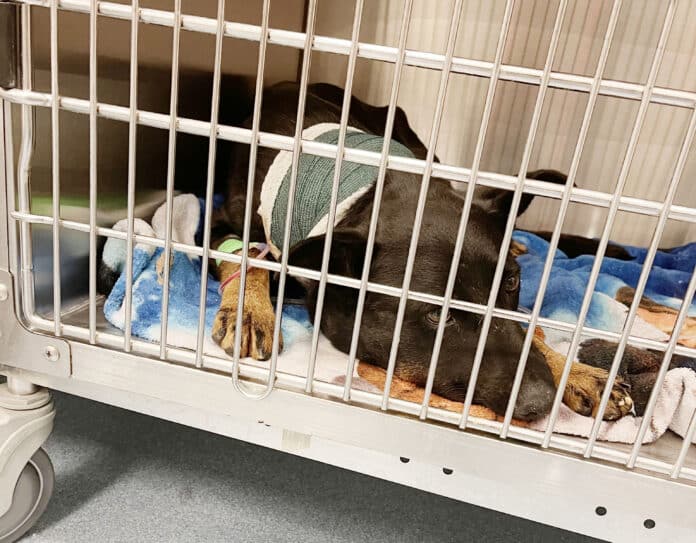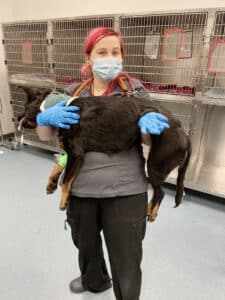
A team of veterinarians and other staff of the Palm Valley Animal Shelter spent nearly an hour last Monday carefully prying out a wire slicing nearly 2 inches deep into the neck of a German shepherd. With her head swollen and ligaments exposed, the area was extremely infected by the time she got to the Edinburg shelter.

(Courtesy photo)
That wire was used as a collar on Ellie, the shepherd, and PVAS Director Donna Casamento said she predicts it was the kind of collar that tightened every time she pulled against it.
Such restraints may soon be considered a criminal offense.
State Sen. Eddie Lucio Jr., D-Brownsville, is presenting a bill this legislative session that would tighten laws on dog restraints, and make any violation a class C misdemeanor, or a class B misdemeanor if the person is a repeat convict.
Under Lucio’s proposed legislation, Senate Bill 474, a collar should only be made up of nylon fabric, leather or similar materials that properly fit the dog’s neck. Tight enough to stay on, loose enough so that they are comfortable.
Additionally, under the bill, the dog cannot be restrained outside with a chain or weighted leash.
Through the legislation, it will be law that any dog left outside and unattended must have access to water, food, and shade from direct sunlight. Its leash should also be at least five times the length of the dog.
Lucio, who is the owner of six dogs, says this bill would not only work to mitigate animal cruelty, but promote safer communities.
“Mistreated animals, especially those chained up in front of yards, can become a public health risk to neighborhoods” he said. “This bill is about safe communities. I am sure we can all point to people in our neighborhoods who have aggressive dogs, those that we’re scared to walk past or let our children play near.
“It’s so often that aggression comes not from the dog’s nature, but from mistreatment.”
Casamento echoed that sentiment, saying “dogs left tethered on inappropriate leashes like Ellie’s that are not monitored can develop behavioral issues. They get frustrated by the leashes.”
PVAS receives dogs with wounds related to improper collars or leashes nearly every week, according to Casamento. Last year, the shelter took in 9,880 dogs. “Ensuring that people are not just leaving dogs tied up in their backyards or leaving them somewhere to fend for themselves is a really good thing,” she said.
“There is so much to be done. This particular piece of legislation is great, it’s a good starting point for us, and we are excited about it and we really look forward to being there to help support coming up with any further legislation. The RGV is a great place and we want to make sure we are a great place for animals, too.”
Susan Valdez, a board member for another local shelter, Yaqui Animal Rescue, is just as hopeful the bill passes.
Valdez said the legislation would help the organization keep the community accountable for caring for dogs properly.
“It allows law enforcement to have the authority to take action and possibly work together with a rescue organization like Yaqui,” she said. “We can step into a situation and either remove the animal if it’s a life or death situation, or work with the owner to provide better living conditions.
“Sometimes law enforcement says they can’t do much, so now we are putting laws in place that gives them more authority.”
Yaqui received about 500 dogs last year, and Valdez said the bill is a step toward making sure dogs across the state are being cared for.
“This bill advocates for responsible animal ownership and holding dog owners accountable,” she said.
“There is an immeasurable value in the contribution that dogs make to our society as a whole, and that needs to be valued by everyone.”
This will be the second time Lucio will propose legislation about dog restraints to the Senate. The senator presented the bill last legislative session in 2019, which collected majority support, but the session ended before it made it to the House floor.




